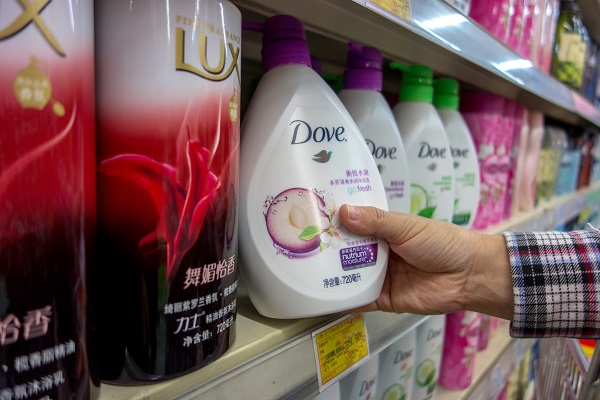Unilever shares above £40 for first time since 2021
26th July 2022 08:10
by Richard Hunter from interactive investor
Despite sky-high inflation and consumer belt-tightening, Unilever shares have rallied 22% in four months. Our head of markets looks at Unilever's latest results for clues as to future direction.

Unilever (LSE:ULVR) is treading a fine line between growth and pricing out some of its customers, but for the moment the strategy is holding up.
At a time when many consumers are looking towards the bargain end of the range, Unilever has been using the benefit of its scale, size and a loyal customer base to ramp up prices. In the half-year, underlying sales growth of 8.1% was achieved, comprising 9.8% in price growth and offset by a decline of 1.6% in volumes. The figure of 8.1% came against expectations of 7% growth, and was powered along by second-quarter growth of 8.8%.
Unilever has long been seen as a defensive play, given the ubiquity and popularity of its products. This is a difficult nut to crack for competitors and indeed the company’s “Billion+ euro brands”, which account for over half of group turnover, also grew by 9.4% in the period, underlining the fact that for the moment the company’s underlying strength remains intact.
- The dividend hero shares fund managers are backing for the long term
- Three big fund alternatives to Fundsmith
- Unilever, GSK, BP and Shell in the spotlight
- Consumer staples shine as inflation soars – but can the boom last?
Second-quarter turnover was also higher than expected, leading to a half-year number of €29.6 billion, a notable increase of 14.9%. In terms of geography, the US and India held up well, while the various lockdowns in China impacted growth in the second quarter.
Underlying sales growth in Europe was more pedestrian, but nonetheless managed to add 4.6%, despite a corresponding drop in volumes. Taken together, this growth resulted in underlying group operating profit of €5 billion, which represented an increase of 4.1%.
Part of the reason Unilever is leaning into its own pricing power is the inevitable spectre of inflation. Input cost inflation resulted in a decline of 1.8% to its underlying operating margin, although the figure remains at an elevated and healthy level of 17%.
At the same time, the scale of cash generation has enabled the share buyback programme to continue as planned, while a dividend yield of 3.7% is perfectly respectable given the current interest rate backdrop.
Its e-commerce channel is also continuing to establish its presence, now representing 14% of total sales, as compared to just 6% in 2019. The group as a whole has also now entered into a new phase of becoming category-focused, which could lead to some significant streamlining in due course. In the meantime, Unilever has also reflected confidence in prospects by raising its underlying sales guidance for the year.
In historical terms, the shares are trading on a cheaper valuation than that seen in the recent past. Even so, concerns around slowing global growth, inflation and an increasingly cost-conscious consumer have not subsided.
- The Week Ahead: Lloyds Bank, Shell, Centrica, BT, Vodafone
- UK bank sector results season: these are the likely winners
- 12 stocks for dividend investors hunting for high yields
As such, the share price has declined by 5.5% over the last year, as compared to a gain of 4% for the wider FTSE100, despite a more positive bounce in the last three months. Over the last three years, the price has declined by 20% which reflects the lingering uncertainty for the group’s general prospects.
Indeed, the market consensus of the shares as a "hold", despite Unilever’s defensive appeal, also points to a jury which remains out for the time being.
These articles are provided for information purposes only. Occasionally, an opinion about whether to buy or sell a specific investment may be provided by third parties. The content is not intended to be a personal recommendation to buy or sell any financial instrument or product, or to adopt any investment strategy as it is not provided based on an assessment of your investing knowledge and experience, your financial situation or your investment objectives. The value of your investments, and the income derived from them, may go down as well as up. You may not get back all the money that you invest. The investments referred to in this article may not be suitable for all investors, and if in doubt, an investor should seek advice from a qualified investment adviser.
Full performance can be found on the company or index summary page on the interactive investor website. Simply click on the company's or index name highlighted in the article.